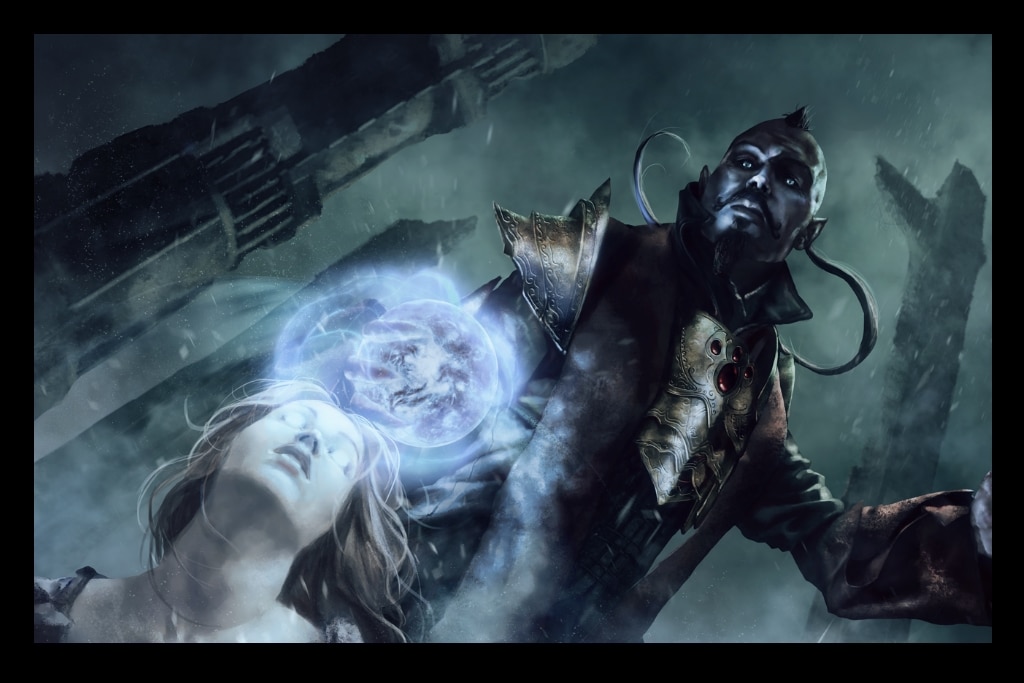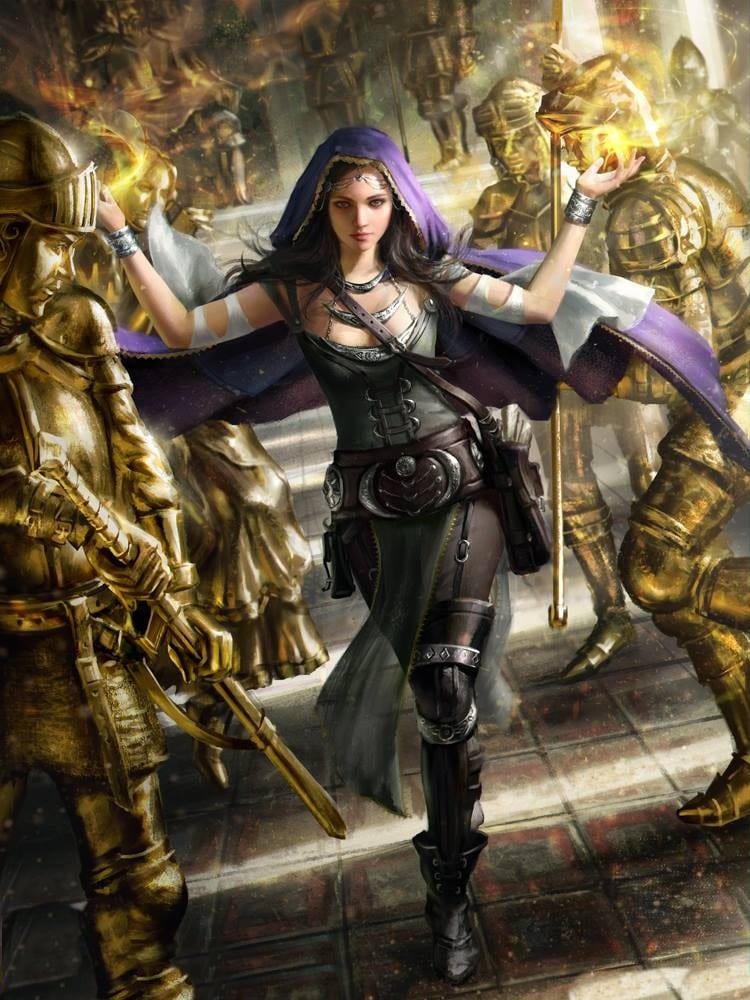The Enchantment Wizard for 5e is one talked about, but very rarely played. The reason often being, their playstyle is that of save or suck spells. Which, while a very often played format, there are many wizard subclasses that do it better. As a result, enchantment wizards in 5e have often considered an NPC subclass. The reason being, you can find many NPC’s with this subclass, but not a lot of players. However, the power of the enchantment wizard is open for fun combinations and playstyles. So, buckle up and enjoy the read as today you are going to learn how enchanting the enchantment wizard is.
How I Am Evaluating Them
For those who have read my previous reviews, feel free to skip this. If you haven’t, welcome! This is going over how I evaluate how strong a class is. There are three things that I am reviewing in the in-depth guide. I look over how strong the subclass is in combat, how much utility it has, and, if applicable, its’ roleplay ability. The reason, everyone’s playstyle is shown to fit their needs.
Now, when deciding if something is good for a guide, I look at what the subclass is trying to accomplish. Then look at how successful it succeeds in that task. For instance, in a previous article on the Divination Wizard I concluded, attempts to make you the ultimate save or suck spell caster. I then figure out how well that ability succeeds in letting you front line, as well as how soon it comes online.
If it is accomplished at level 2, then it is early game. Level 6 it is Early-Mid, Level 10 Late-Mid, and Level 14 is late game. I rate earlier tiers better as most Dungeon and Dragons Campaigns do not go beyond level 8. Without further adieu, let’s start this review on the 5e Enchantment Wizard.
Color Meaning
GOLD- “That’s gold Jerry! Gold!” If an ability is highlighted gold, then this means that this ability not only is what defines your subclasses but accomplishes it better than almost any other subclass. I rarely do Gold ratings, so definitely pay attention to them if you see me do it.
Sky Blue –If the ability is sky blue, it means that this ability is a defining trait in your subclass but for one reason or another is not game-breaking like gold.
Blue– If it is just blue, then it’s a good ability but there are plenty of other abilities that perform better.Still better to have in a subclass than other colors.
Black. Black is ok. These are your more niche abilities that have bonuses in some situations but not useful in others.
Purple – Purple is for very niche abilities. They have times when they are good, but these are rare and almost never come up. Not the best color to see for an ability.
Red– Red is dead. It is the worst color to see on an ability. That said, no matter the color, an ability can work so don’t ignore a subclass if they have a red. Enough imagination and can-do attitude will make it okay but not optimal.
Enchantment Wizard 5e (mid-late)
The 5e enchantment wizard attempts to accomplish charming and controlling opponents through charm effects and manipulation of people’s control. Some obvious spells that they hold are sleep, hold person, and dominate monster. Each of these are considered defining spells for any wizard. But, while the 5e enchantment wizard is supposed to focus on enchanting, many of their abilities do little to directly power these spells. Because of this, the enchantment wizard suffers from some good abilities, but nothing that builds on each other.
Enchantment Savant
Enchantment Savant is an ability for the enchantment wizard that gives the wizard subclass the ability to copy down all enchantment spells at half cost and time for their spellbook. A passive ability that while fits with the wizard, does not improve them by much.
If you look at my previous articles, the savant ability, while nice is nothing great. The reason being the chances of you to find those spells is few and far between, and for the spell to be good even rarer. However, while the enchantment wizard has about 14% of all wizard spells, almost all of their spells are considered strong for each level. Therefore this is actually pretty solid for a savant ability.

Enchantment Wizard 5e: Hypnotic Gaze
Next comes an ability that completely incapacitates and destroys the BBEG from ever doing anything… at least theoretically. In reality, the ability has a 54-62% chance of succeeding with over 120 monsters being immune to its effect.
Then what does this potentially powerful skill actually do? Effectively, Hypnotic Gaze allows you to render an enemy unconscious as long as you are within 5 feet of them and they fail their wisdom save against your DC. However, to keep this going longer than one round, you need to stay within 5 feet of the enemy and use your action to maintain it. They must also take no damage or break out of the gaze’s effect.
As you can see, while a potentially powerful ability there are too many downsides to make it work. One, a wizard being within 5 feet of an enemy is never good, especially when this ability is used for the boss of combat. Two, to keep the ability going on, you must stay within 5 feet and use your action to maintain. Therefore, if you wanted to do something else, you give up control over the boss
Hence, if you wish to make this useful, it is best for purely social and roleplay scenarios. Need to distract the guard? Send the enchantment wizard over to charm them and let the others past. Or if a person caught you doing some not so lawful good things, enchant them long enough for your group to “take care of them.” With these in mind, the ability is at best okay since there are so many requirements to make this ability good.
Instinctive Charm
Ever wanted to have the enemy attack their own allies instead of you? Well, at 6th level the enchantment wizard can definitely do that, potentially. The ability can be found in the Player’s Handbook and basically states:
When an enemy within 30ft of you declares an attack against you but before you know the outcome, you can use your reaction to make them succeed a Wisdom save against your DC. If they fail, then they instead choose the creature closest to them that they can attack them. If no one else is able to take the attack, the attack still comes at you. They automatically succeed if they are immune to charm, and If they succeed in anyway, are immune to the effects until you finish a long rest. If they fail, you can use this ability on them again.
Now that is a lot to take in, so I am going to break it apart into two sections; the power of the ability, and the conditional situations that can happen with this ability. Behind the power of the ability, it is actually pretty strong, upon reaching 6th level, when a monster rolls for his save, he has a 61.6% chance to fail the roll. Meaning when you use this ability, the enemy will miss 61% of the time. If you were to use the spell shield, you would have the same chances to be hit if you had a base 15AC. If you have anything less than a 15 before shield, you actually would have a higher chance to be hit after casting shield than using Instinctive Charm. Making this a rather solid ability for surviving by pure power.
Instinctive Charm: Conditionals
Now while baseline Instinctive Charm is better than shield for most wizards, I actually prefer shield more; and here’s why. Shield is a constant static guarantee. When you cast shield you really do not need to worry about “does this meet requirements”. However, with instinctive charm, you need to make sure of a few conditionals: are they immune to charm, is there another target in his attack range, is the other target an enemy or ally, and do I think this attack will hit me. Therefore, while Instinctive charm will be better for a wizard on average, it has a lot of “what if’s” that could make the ability noticeably worse than shield.
Now, the choice is up to you on which ability to use for the scenario so having both is definitely an acceptable way to basically having a backup shield that costs 0 spell slots, but there are a few notable ways to make this ability a little better to reduce the “what if’s” to the ability. The first being, the condition of “knowing when the attack will hit you”.
The specific wording to instinctive charm is, “when a creature makes an attack roll against you.” Because of this, if your DM plays with dice rolled in front of players, as soon as you see what the die roll is, but before he states the total value, you can declare to use the ability. By doing this, you can reduce your chances of using it against a 1, but also ensure you will use it on rolls like a 20. Besides that, the other ways to reduce “what if’s” is by positioning yourself close to an ally who can take the hit or staying in proximity range of enemies to take the hit but that won’t target you.
Enchantment Wizard 5e: Split Enchantment
Split Enchantment is by far the most talked-about ability for the enchantment wizard. After all, the value of casting 2 enchantment spell twice for the price of one, is insane! In fact, if you look at almost any other guide, this ability is given one of their highest marks. Then why do I only give it a blue rating? Because the value is good, but the effectiveness is lacking.
Split enchantment allows you to choose a second target whenever you cast an enchantment spell. This means you can dominate two different people, monsters, or anything else at once. As you get later into D&D hordes become less of a challenge and serious threats become the main cause of fear. To put it into perspective, when you are an adventurer just beginning, classic fight scenes are a horde of zombies, or maybe a goblin group and a hobgoblin. In both of these situations, there is a horde all at similar power levels or maybe one that is slightly more powerful than the others. At higher levels many fights are adventurers versus one; some common examples being beholder or dragons. In these scenarios, taking control of him can have a tremendous impact on a fight as it can buy you time or use them to wipe out any small creatures.
Therefore, chances are when you are using the split enchantment feature all your doing is taking control of one powerful creature and one chump blocker. Not a very effective strategy. Moreover, you should remember that as they fight they run the risk of breaking concentration when taking damage. As such, while the value is good, the overall usefulness of the ability is lacking making it a mediocre 8 out of 10 times.

Alter Memories
I give you the only wizard subclass to use charisma, and what a final ability it is. Alter memories let you make one creature unaware they were charmed. Meaning, if you are a friend’s cantrip happy wizard, then you can do it as much as you want without them realizing it. Where does charisma come into play? The charisma comes into play on the second feature of the ability which is: If a creature is charmed by you, you can make them forget a period of time equal to 1+ cha modifier if they fail an intelligence saving throw. However, the time forgotten cannot exceed the amount of time they were charmed.
The two combined can lead to some fun shenanigans but nothing that at level 14 will make or break your game. The chances of a creature failing against an enchantment save at this level is around 58%, meanwhile, an intelligence saving throw fail rate is roughly 71%. This means for you to get both effects off, you have about a 42% chance. Now that is not terrible odds by any means, but when taking into practical application of the ability, it achieves little.
For example, say you dominate a person and you use them for battle, well like most adventurers, if he is still charmed you have to decide to kill him? Or let him live? Now, you could let him live, and they will forget with alter memories, but how much does that change? If he saw you at all before he was charmed then he will remember you were here even if he fails the saving throw to lose memories. If you wish to learn more about it, here is an entire Reddit thread on the ability.
Enchantment Wizard 5e Examples
So, now that you understand each ability, what are some classic fun builds to help you players just starting out and the veterans for some new ideas? Well, I’m so glad I asked. There are a few different things I would do.
To start off when choosing your race, there are three notable and fun options to choose; they are half-elves, Yuan-Ti, and warforged. Half-elves are a very notable one as they get a +2 Charisma and +1 to two other stats, moreover, you gain a large number of skills beneficial to the classic enchantment wizard such as extra skills, resistance to charms, and a lot of languages. These can function to create the suave enchantment based wizard who uses enchantments.
Now, if half-elves aren’t your take, then the Yuan-ti are. The Yuan-ti are the classic enchanting snake creatures who innately can cast one of the best enchantment spells, suggestion. This makes them great wizards with innate spells, resistance to magic, intelligence, and charisma bonuses, plus the fact that they are usually on the evil side, you can make a great nefarious enchantment wizard exploit the gullible.
Finally, is my favorite build which is the enchanting warforged wizard. This build goes for the dashing robot who is obsessed with enchanting magic items after all a magical enchantment construction obsessed with magical enchantments makes sense. Moreover, I love the idea of a gentleman robot enchanting the people around him. But, besides the personality in mind, the warforge sport a great more up-close and personal approach. With this, they gain additional AC, +2 CON and +1 INT, and a slew of other useful abilities. If you are curious more about the Warforged, I have a whole article for it here.
Conclusion
In conclusion, while the enchantment wizard has abilities that all playoff enchantment, their abilities have many conditionals to them that make it good, thus making this a class that thrives in certain scenarios and play average when not in the scenarios. If, after reading through this article, you are not sold on the enchantment wizard, but still want to play a manipulative based class, I suggest the Illusion Wizard. They are great in the art of subtlety and manipulation opponents to control the scenario.
P.S. Now that you know the general information for the Enchantment wizard. Why don’t you kick it up a notch with Wizard’s Mastery: A Complete Wizard’s Guide! Giving you even more information then than this for all ten wizard subclasses with ways to make your gameplay more memorable and more unique. Check it out today!


I just started back into D&D after many years away and just found your website. I greatly appreciate all the work that you have put into this! Since comments are closed are the other subclass’s I wanted to make a generic wizard comment before I comment on enchantment.
First, in regard to race, I feel that High Elf makes a great wizard class. I know that at first glance the Dex bonus seems kinda useless, but it really does have it’s advantages. The initiative bonus is priceless. Get that Fireball off before the stupid Fighters run in! CC the boss straight away! you are the wizard, so going close to first will make the rest of your group smarter!
Now for the Enchantment wizard. To quote Sun Tzu: “Supreme excellence consists of breaking the enemy’s resistance without fighting.”
Enchantment is all about roleplay and it is actually a game breaker if you play it right. Things like hypnotic gaze can be, and should be used before combat begins, but even in combat it’s cc power is extremely strong. Also on instinctive charm, it’s limit is once per attacker, not once per short rest. This is makes it more effective than shield if you are low on spell slots. And if your DM role-plays the action the way it should be, it will cause havoc among your enemies.
Twin spells? Seriously overpowered. Love it!
Really the only reason why not to play Enchantment is determined by you DM’s ability (or williness) to let you role-play the subclass the way it was designed.
P.S. One note on conjuration, giving all the palace guards hot, fresh…. poisoned cookies. I mean after all poison is not magic right?